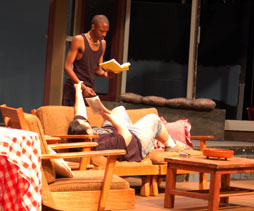MCT—Only fools or the very stubborn still doubt American Idol’s prowess as a pop-culture powerhouse.
Idol isn’t just soundtracking our lives and dominating the late winter/early spring months of TV viewing, it’s rewriting the English language.
Talk about your cultural half-life: below is a list—a greatest hits, if you will—of American Idol’s contributions to the way we speak.
Simon’s Similes
Simon Cowell’s way with words often inspires lusty boos and silent tears. Simon prefers to indulge in similes meant to bludgeon ambitions: equating Idol hopefuls with wedding singers or—horror of horrors—lowly karaoke enthusiasts.
Oversinging
At some point, nearly every contestant who takes to the Idol stage oversings, stretching a note far past its natural point of conclusion.
Pitchy (or pitchiness)
Webster’s defines “pitchiness” as having to do with light, but on Idol it’s a murky musical term often thrown out to describe renditions that don’t hit notes so much as slide around them.
Fan-Club Monike
It seems as though there’s a million of ‘em—Claymates, Soul Patrol, Yaminians, the Jayrations (for that never-say-die Sanjaya Malakar crowd), the Dawg Pound and so forth.
Too low on the “Yo”
Early in the sixth season, the Dawg himself pointed out that one of contestant Haley Scarnato’s performance lacked something—“the ‘yo’ factor,” to be precise. It’s anyone’s guess as to exactly what the “yo factor” is, but Haley seemed to know what Randy meant: The next week, she took the stage in a much sassier outfit.



























